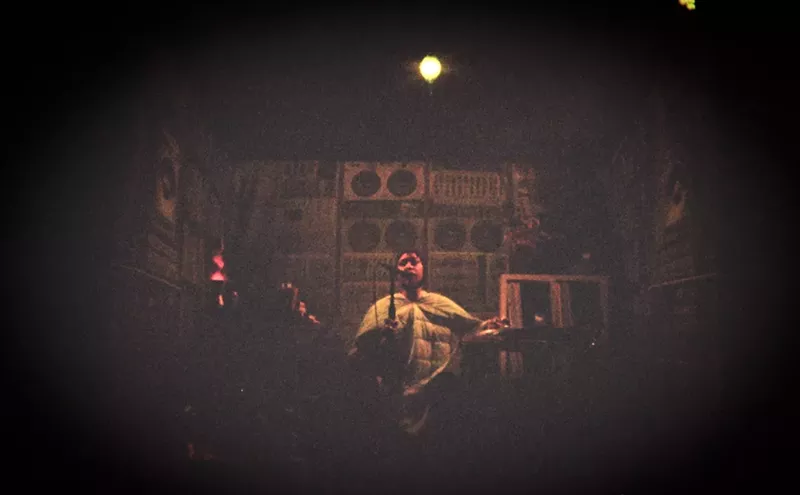When asked to describe Autolux's sound, guitarist Greg Edwards teasingly replied, "That's what you do, right?" It was in the middle of the afternoon, and the band was rolling up to San Francisco for the start of its tour with the Peels and headliner the Raveonettes. (That tour hits Fort Lauderdale's Culture Room Sunday, May 22.) "There's a certain amount of intellectuality or analysis that can go into making music, and then it's almost a negative influence at that point," said Edwards. When asked to elaborate, he didn't. "For people in a band to come up with some succinct sentence about what the band is or what the identity is or adjectives or any of that stuff ... it's incredibly difficult."
So what does Autolux sound like? Some listeners have lauded Edward, lead vocalist and bassist Eugene Goreshter, and drummer Carla Azar as modern practitioners of the shoegazer movement that developed during the early Nineties via bands such as Ride, My Bloody Valentine, and Slowdive. Incidentally Edwards is the group's most accomplished resident, having co-led Nineties rock contenders Failure. As in that band, he layers Autolux's songs with cascading guitar feedback that rarely repeats, shifting from grungy and rhythmic to brittle, melodic noise.
"I think there's a certain sort of textural aesthetic that we like in terms of how instruments interact and stuff. We like things to be a little off-kilter and surprising, and not have just a bunch of complacent metered noise," said Edwards. But he added, "Noise is really poppy. Whatever aspect of us is noisy, it's not like a conscious effort to be noisy. The noise is there because, to us, that sounds really musical, and we like it. The noise and the pop are not mutually exclusive."
Certainly Autolux's debut album, Future Perfect, is a thing of mystery and beauty, from the lithe noise pop art of "Turnstile Blues" to the neo-grunge "Sugarless." But Edwards's answers proved to be too mystical, so this writer asked to speak to someone else in the group. Almost a week later, it was Azar on the phone, and the tour bus was rolling toward Minneapolis for a date at First Avenue, the nightclub made famous by Prince in Purple Rain.
Azar was more focused on the business of being in Autolux. Formed in 1999, the trio became the first act signed to DMZ, a new record label formed by roots-rock performer and producer T. Bone Burnett and movie auteurs the Coen Brothers, in 2003. Burnett produced Future Perfect, and the disc quietly hit stores this past October.
The bandmates have a lot of support behind them: In addition to DMZ, which is distributed by Sony/BMG, they are managed by Ian Montone, whose Monotone Management roster also includes the White Stripes and the Shins. But so far the minor gem that is Future Perfect has yet to achieve mass appeal or widespread critical acclaim. It isn't getting bad reviews; the few national critics who have reviewed the disc have given it superlative notices.
Azar noted that the band has a strong following on the West Coast, played a well-received set at the Coachella festival last month, and debuted a video for Future Perfect's magnificent opener, "Turnstile Blues," on MTV2. She added that they are trying to build a genuine grassroots following instead of saturating people with major-label advertising, much like the White Stripes did when V2 picked up their third album, White Blood Cells. "The plan was to come out, send the music to radio stations and college, but really focus on college radio, and hopefully people would hear about it from us playing live, college play, and press," said Azar.
But she also acknowledged, "That's not to say that we're happy with the job Columbia has done, because we haven't been." She alleged that the marketing people at that label didn't know how to work Autolux's album. So this past April Autolux moved from Sony's Columbia imprint to Epic Records, home of platinum-certified indie heroes Modest Mouse.
"T-Bone signed us. [Columbia] never even heard our music, and then they were sort of expected to know what to do with us, and they never did know," Azar said. "I think, in today's times, unless you're some act put together by the label, I think that the band and the management have to be responsible for their own careers. I don't think major labels know what to do with developing bands."
Rock and roll history is littered with near misses, and the recent surge of new major-label contenders, which has yielded plenty of hype (see Bloc Party and Hot Hot Heat, among many others) but few genuine success stories, will likely add to the cult band graveyard. No matter what becomes to Autolux, though, Future Perfect is an undeniably good album deserving of a wider audience. Maybe Edwards, for all of his abstractions, was right: The music is all that counts.












